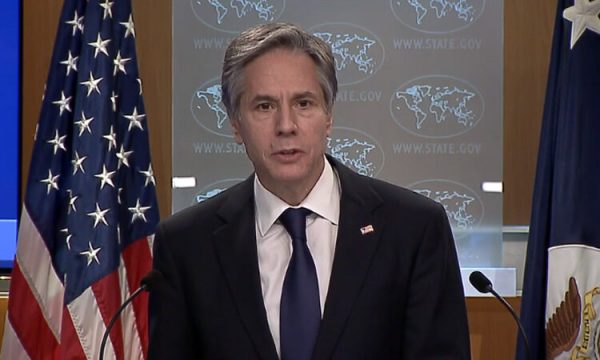A report by the US Department of State says that 74 per cent of inmates in Nigerian prisons are “awaiting trial” suspects.
In its 45th annual human rights report, which contains a damning expose on the Nigerian justice system, the US Department of States cites factors hindering the Nigerian judicial system as shortage of trial judges, trial backlogs, endemic corruption, bureaucratic inertia, and undue political influence.
“In many cases,” it says, “multiple adjournments resulted in years-long delays. Some detainees had their cases adjourned because the NPF (Nigeria Police Force) and the NCS (Nigerian Correctional Service) did not have vehicles to transport them to court.
“Some persons remained in detention because authorities lost their case files. Prison employees did not have effective prison case file management processes, including databases or cataloguing systems.

“In general the courts were plagued with inadequate, antiquated systems and procedures.”
It noted that detainees may challenge the lawfulness of their detention before a court and have the right to submit complaints to the NHRC, but that this is of no consequence because even with legal representation, they often wait years to gain access to court.
The report noted that conditions in Nigerian correctional facilities “remained harsh and life-threatening”.
Prisoners and detainees, it said, are subjected to gross overcrowding, inadequate medical care, food and water shortages, and other abuses – with some of these conditions resulting in deaths.
It identified overcrowding as a pervasive problem.
It said: “Although the total designed capacity of the country’s prisons was 50,153 inmates, as of October (2020), prison facilities held 64,817 prisoners. Approximately 74 per cent of inmates were in pretrial detention or remanded. As of October there were 1,282 female inmates. Authorities sometimes held female and male prisoners together, especially in rural areas. Prison authorities sometimes held juvenile suspects with adults.
“Lack of potable water, inadequate sewage facilities, and overcrowding sometimes resulted in dangerous and unsanitary conditions.
“Disease remained pervasive in cramped, poorly ventilated prison facilities, which had chronic shortages of medical supplies. Inadequate medical treatment caused some prisoners to die from treatable illnesses, such as HIV/AIDS, malaria, and tuberculosis.”
The Department of State also said it discovered that inmates in Nigerian prisons were subjected to torture and extortion.
It said guards and prison employees reportedly extorted inmates or levied fees on them to pay for food, prison maintenance, transport to routine court appointments, and release from prison.
It said: “Female inmates in some cases faced the threat of rape. Only prisoners with money or support from their families had sufficient food. Prison employees sometimes stole money provided for prisoners’ food. Poor inmates sometimes relied on handouts from others to survive.
“Prison employees, police, and other security force personnel sometimes denied inmates food and medical treatment to punish them or extort money.”
The US report examined the human rights standing of 198 countries with a focus on seven sections, including press freedom, corruption and transparency.
US Secretary of State, Antony Blinken, announced the publication of the report on Tuesday, saying his country acknowledged the “work ahead and expects all nations to respect human rights and fundamental freedoms.”

